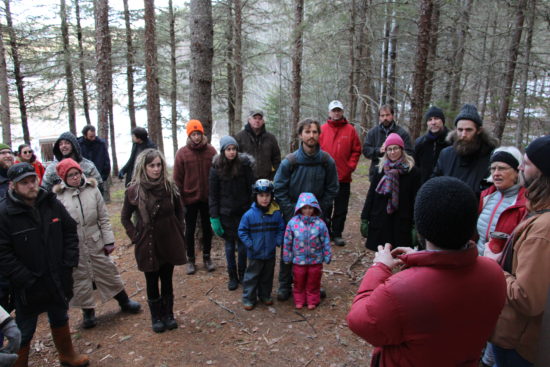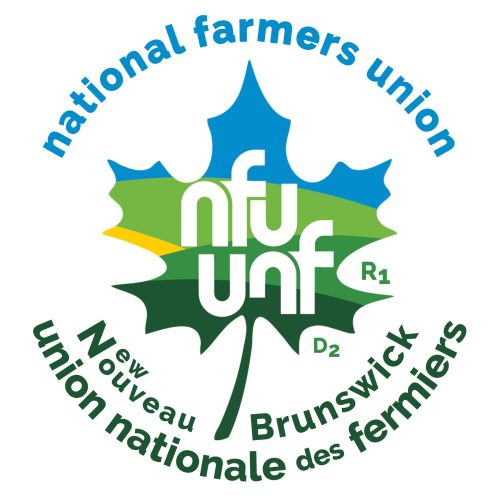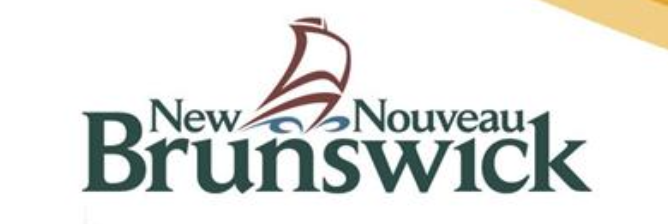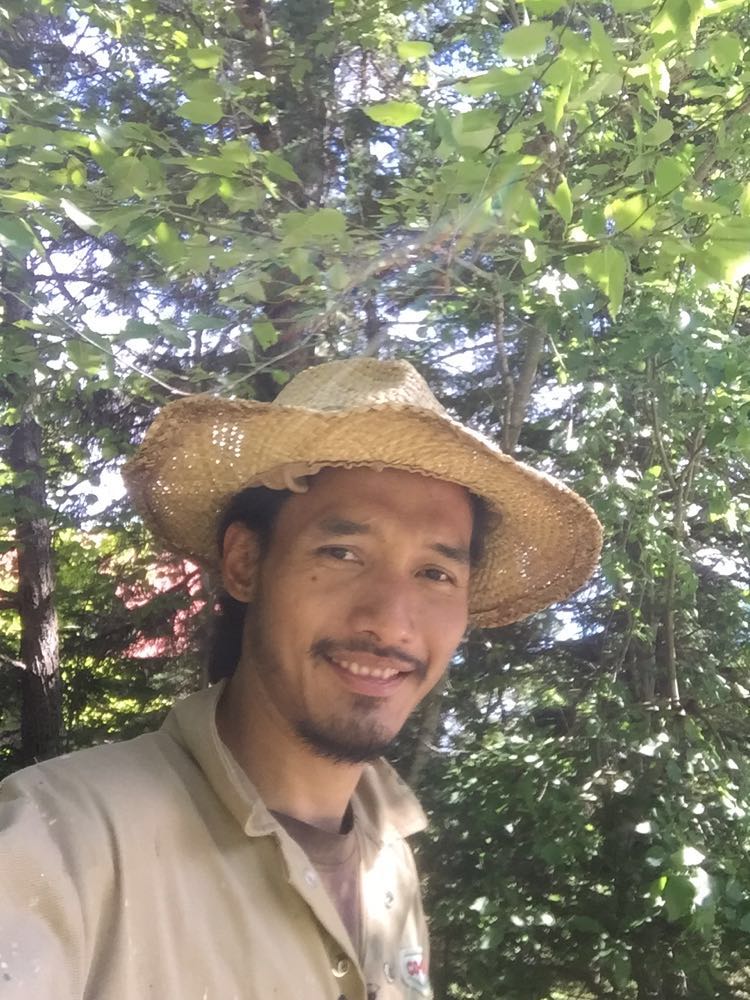Hosted by the NFU-NB and the NFU Youth of Region 1
Written by Katherine Aske
To see more photos from the day, click here.
On Sunday, January 29th, at the Penobsquis Community Hall, over 40 new, experienced, and aspiring farmers came together to share ideas, inspiration, and food, and learn about innovative forms of farm financing. Let us first say how grateful we are to all who made the effort to come – thank you for helping to expand this network of like-minded family farmers! We were lucky to have clear roads and sunny skies, as farmers and our presenters hit the road early in the morning from across the Maritime provinces, and drove as many as 5 hours to attend.
After a bit of a late start (coffee and chatter filled the free time!) we dove into the day, beginning with an explanation of the NFU for the uninitiated. The first speaker was Sylvain Gadbois, agroeconomist and Business Development Officer with the NB Department of Agriculture, Aquaculture, and Fisheries (DAAF). Sylvain gave a brief summary of some of the programs accessible through DAAF, and passed along the exciting news that they have now hired specialists to help newcomers to agriculture take the steps they need to start farming.
Gil Miner, Senior District Director of Farm Credit Canada (FCC), spoke next. Gil explained the different types of loans offered by FCC, and also gave advice on what to come ready with when asking for financing [in short, the 5 C’s: Character (including your credit history); Capacity (how you will be able to pay it back); Commitment (how are you showing it to the lender?); Conditions (repayment terms you need); and Collateral (without cash flow, you need collateral)].
Christina Allain, of the NB Co-operative Enterprise Council, began by telling the crowd that the oldest co-op in the world is in Sussex NB – the Sussex and Studholm Ag Society #21. She explained the basics of co-operatives, from how they are structured, to what purposes they serve. She also highlighted Really Local Harvest (La Récolte de Chez Nous) as a great example of a farmer co-op in NB.
Alison Butler spoke next; she is one of the founders of FarmWorks in NS, a Community Economic Development Investment Fund (CEDIF). FarmWorks, which incorporated in 2011, has raised over $1.5 million, and distributes loans of up to $25,000 to those NS businesses which are in some way contributing to FarmWorks’ mission of Healthy Farms, Healthy Food, Healthy People, and Healthy Communities. She kept things tangible by giving many examples of success stories, such as the Port Medway Grocer, a country store and post office which has rejuvenated their small rural community, and the Meander River Farm, which no one would give money to until they received their first $25,000 from FarmWorks.
Rose Murphy, co-owner of the Townhouse Brewpub & Eatery in Antigonish, came to the event to talk about how her and her partner were able to start their restaurant through a CSR (Community Supported Restaurant) model, which has been adapted from the CSA (Community Supported Agriculture) model. It worked like this: 50 people each paid $1000 to become ‘subscribers’ of their restaurant, and then once the restaurant opened, they received a $25 gift card to the restaurant every month for 4 years (totalling $1200 in food and drinks!). This model is similar to CSAs in that customers are sharing the risks with business owners. While $50,000 was not enough to start the Townhouse on its own, it helped Rose and her partner to obtain $100,000 in more traditional loans from 7 private investors, and eventually, a loan from their Credit Union. Rose’s success story was truly an inspiration, especially because the restaurant buys from over 30 local producers, employs 28 people, and makes its own beer!
Jeff Harriman, Senior Analyst for the Financial Consumer Services Commission (FCNB) in NB, was the last speaker of the morning, and he introduced everyone to Community Economic Development Corporations, or NB’s version of CEDIFs. The primary difference between CEDIFs and CEDCs is that while CEDIFS offer community loans, CEDCs offer community investment. For more information on CEDCs, visit www.fcnb.ca/cedc.html. Part of Jeff’s role with the FCNB is to develop capital markets, such as crowdfunding. He is currently exploring the possibilities of bringing the CEDIF model to NB. If you are interested in this happening, either on the lending or the lendee end, reach out to him at (506) 643-7749.
Next was the potluck lunch, which was a huge feast, given that most of the attendees are people who dedicate their lives to good food! The break was most welcome in that it allowed for catching up with friends and making new ones. A highlight of the event was witnessing all the new and surprising connections that were being made, which will surely lead to friendships and more mobilization among the new farmer community in the future.
After lunch, we began a discussion forum by first getting everyone to suggest topics. It quickly became clear why these events are so valuable – we had 15 topics listed on the board in no time, from “unifying our voice”, to value-added products and processing, to crowdfunding, to managing HR on the farm. We eventually broke up into two groups, one discussing financing, and the other, social media and mobilization. While there was certainly value to these conversations, while reflecting on this event we recognized that smaller groups would have been more effective, as they would have allowed for a greater diversity of people to speak, and for more topics to have been covered.
Finally, the day concluded with some fresh air! We drove down the road to Community Forests International’s 700-acre piece of land, Whaelghinbran Farm, which they are turning into a Rural Innovation Campus. There, Zach Melanson, the Communications Director, and Shamus Griffith, the green builder, took us on a tour. We got to learn about the land they are stewarding, and their visions for the future. They took us into their backwoods cabins and explained how they were built, and also discussed how they have become the first in NB to sell carbon offsets on their woodlot. They are working to make carbon offsets a more accessible possibility for other New Brunswick land owners, so that we can properly “value our trees standing up”. (Note: The NFU has mixed feelings about carbon offsets – to learn more click here.)
Whew! What a long and wonderful day of learning. Thank you again to all of our speakers, and to all our attendees. We hope that going forward, we can see an exponentially increasing number of events that bring new and aspiring farmers together, so that we can continue to realize our vision of stewarding the lands and food systems of the Maritimes and building healthy, vibrant communities.





